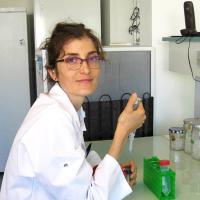
Claudia Bartoli, a young researcher studying the plant microbiota
Published on 23 March 2019
Claudia began her scientific career in 2008 with a BSc degree in evolutionary biology obtained at the University of Tuscia in Italy.
From sea to soil...
She went on to complete a Master’s degree at the University of Wageningen in the Netherlands in which she investigated the immune responses of carp to Trypanoplasma borrelli.
Claudia then moved her attention from marine biology to plant-microbe interactions by completing a European PhD from 2011 to 2014 between the University of Tuscia and INRA’s Plant Pathology research unit in Avignon. During her PhD, she focused on the role of non-agricultural habitats on crop diseases caused by the phytopathogenic bacterium Pseudomonas syringae. For this, she used a multipronged approach between microbial ecology and genetics.
In 2014, Claudia further continued her research with a post-doctoral fellowship at the Laboratory of Plant-Microbe Interactions (LIPM) in Toulouse, where she focused on the interactions between the microbiota and pathobiota in natural populations of Arabidopsis thaliana and their role on plant health. This experience allowed Claudia to open up new perspectives on the complex interactions between microbial populations and plants in an ecologically realistic context. In 2017, Claudia carried out a second post-doctoral fellowship at the LIPM, to study wheat-microbiota interactions and to further investigate the role of plant genetic diversity and agricultural practices in modulating this interaction which in turn effects crop health.
Studying plant microbiota to decrease the use of phytosanitary products
In 2018, Claudia was hired by INRA’s Plant Health and Environment Division (SPE) to join the Institute for Genetics, Environment and Plant Protection (IGEPP) at the INRA research centre of Rennes. She works on Brassicaceae-microbiota-bioagressor interactions in the Resistance and Adaptation team.
The young researcher and her colleagues used approaches at the interface between ecology, pathology, entomology, nematology and plant genetics in order to identify and understand how bacterial and fungal populations are recruited by plants to trigger defence processes and/or limit the development and spread of bioagressors in the Brassicaceae.
Claudia’s main scientific aim is to identify factors that shape plant microbiota with a beneficial effect on the plant (i.e. preventing disease) with the perspective of reducing phytosanitary products.
In the short term, Claudia wishes to submit a project for a European Research Council (ERC) Starting Grant, designed for young researchers in need of financing for their projects. She is also considering a short-term internship in a French or foreign laboratory to improve her knowledge on metagenomic techniques and the analysis of data obtained from Nanopore high-throughput sequencing.
- 2017-2018 Post-doctoral fellowship at the Laboratory of Plant-Microbe Interactions, INRAE/CNRS, Toulouse
- 2014-2016 Post-doctoral fellowship at the Laboratory of Plant-Microbe Interactions, INRA/CNRS, Toulouse
- 2014 European PhD in the field of plant-microbe interactions. University of Tuscia (Italy) in collaboration with INRA’s Plant Pathology unit in Avignon
- 2010 MSc degree in Molecular Biology and Immunology in the field of fish immunology, University of Tuscia (Italy) co-supervised with the University of Wageningen (Netherlands).
- 2008 BSc degree in Evolutionary Biology in the field of Zoology, University of Tuscia (Italy).
- 2004 Baccalaureate in Mathematics and Physics.
One of the challenges of agriculture is to ensure food security by implementing sustainable farming systems with a lower impact on the environment. By using a multidisciplinary approach combining ecology, biology and mathematics, Claudia Bartoli’s research project aims to identify and functionally validate the ability of microbial populations to limit attacks by certain bioagressors and pathogens on Brassicaceae.
To achieve this, her project integrates methods in the fields of meta-omics and statistics to identify the microbial interaction networks and functional modules associated with plant resistance phenotypes against bioagressors and pathogens. These statistics-based approaches make it possible to identify microbiota modules that may play a central role in biocontrol. However, functional validation of the role of these microorganisms in plant defences against pests and pathogens is still needed.
In this context, part of Claudia’s project aims to adopt a culturomics-based approach to isolate and characterise bacterial and fungal communities using high-throughput microbiology methods coupled with sequencing methods that lead to high-quality genomes. Metabolic characterisation methods are also used. This fine-tuned characterisation of the microbial consortia and plant resistance phenotypes will allow researchers to validate whether and in which entity these microbial consortia can protect Brassicaceae crops and to identify the genes and metabolites involved in the biocontrol processes.
To help carry out Claudia’s project, financial support has been given by Rennes Métropole for setting up a culturomics laboratory at the IGEPP. The research carried out in this laboratory will make it possible to identify microbial consortia with the ability to limit Brassicaceae epidemics caused by soil-borne bioagressors, and to develop agronomic practices based on soil microbial diversity by limiting the use of phytosanitary products .
This research will also take into account the effect of agricultural practices and abiotic variables such as soil and climate on microbiota diversity in order to identify factors that shape microbiota diversity in crops. The results obtained will lead to the development of integrated farming management by coupling the knowledge on the practices favouring beneficial plant microbiota, but also to use microbial consortia able to limit Brassicaceae epidemics caused by soil-borne bioagressors, and to develop agronomic practices based on soil microbial diversity by limiting the use of phytosanitary products. .
